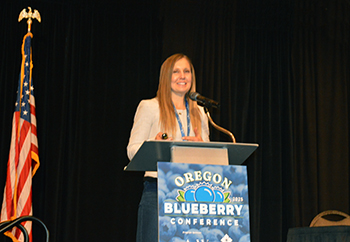NABC Amplifying Blueberry’s Voice in D.C.
An executive with the North American Blueberry Council (NABC) said the organization is hopeful that U.S. Labor Secretary Lori Chavez-DeRemer can help bring fixes to long-standing issues within the U.S. H-2A Visa program for temporary farmworkers.
 |
Speaking at the Oregon Blueberry Conference, Alyssa Houtby, director of government affairs for the North American Blueberry Council, said NABC is working with Congress to bring forward “a compromise solution that supports the ag industry and provides some surety when it comes to your domestic workforce.” |
Speaking at the Oregon Blueberry Conference on February 4, which was ten days before Chavez-DeRemer was confirmed as U.S. Labor Secretary, Alyssa Houtby, director of government affairs for the NABC, said the organization developed a good working relationship with the former Congresswoman from Oregon during her one term in Congress and was excited with her selection as Secretary of Labor.
“We are so thrilled that she is going to the Department of Labor and she’s bringing with her her crack staff from the Hill who are committed personally to helping farmers address the labor crisis,” she said. “We know for sure that when she is confirmed that one of her first priorities in her new role is going to be to tackle within her ability as Secretary of Labor some of the issues that we have with the H-2A program.”
As part of this push, Houtby said the NABC plans to work closely with Congress to bring forward “a compromise solution that supports the ag industry and provides some surety when it comes to your domestic workforce.”
“There has not been a will in Congress or at the administrative level to move that forward like there is right now,” Houtby said.
Houtby noted that the NABC has spent the past two years elevating the blueberry industry’s profile in Washington, D.C. “Prior to a couple of years ago, the blueberry industry was not well represented in D.C, so we spent the last two years elevating that profile and engaging with Congress and the former administration on all of the priorities that are important to you.”
Among the industry’s priorities, she said, was negotiating for favorable provisions in the next Farm Bill. “We are going on year three of negotiating a Farm Bill and we stand to gain a lot.”
Among federal programs the NABC is addressing in the Farm Bill is crop insurance, specifically in how to make the program more beneficial for growers. “We want to make crop insurance actually work for growers rather than just being another line item on your expense spreadsheet,” she said.
In an update provided to the Oregon Blueberry Newsletter in August, Houtby said that much of what the association pushed for in the Farm Bill was included in the “One Big Beautiful Bill” that was signed by President Trump on July 4, including the crop insurance improvements the association sought. Still, several priorities remain unfinished, including new funding for the IR-4 Project and other priorities that are expected to be taken up in what is being called “Farm Bill 2.0.” Houtby added that the NABC continues to press Congress to pass a Farm Bill this year.
In her presentation at the Oregon Blueberry Conference, Houtby said that NABC is working collaboratively in Washington, D.C., with several specialty crop industry organizations, a fact that gives the blueberry industry the kind of clout it wouldn’t have if it worked alone.
“No commodity in the specialty crop industry is powerful alone, but we are very powerful as a collective organization. And until the last few years, NABC just hasn’t been a player in this space. So, we’re very happy to be doing that work on behalf of the industry.”
|
“No commodity in the specialty crop industry is powerful alone, but we are very powerful as a collective organization,” she said. “And until the last few years, NABC just hasn’t been a player in this space. So, we’re very happy to be doing that work on behalf of the industry.”
Houtby added that the organization has formed a Government Affairs Committee to steer policy, and that in 2024 the committee ratified its first ever NABC U.S. Policy Platform. The platform outlines the organization’s positions on several topics, including trade, she said.
"We support fair trade, not free trade,” she said. “And we are working with the administration, with Congress, to make sure that the trade agreements that we have in place are fair. We do look forward to engaging with the administration on the USMCA (United State-Mexico-Canada Agreement) review scheduled in 2026.”